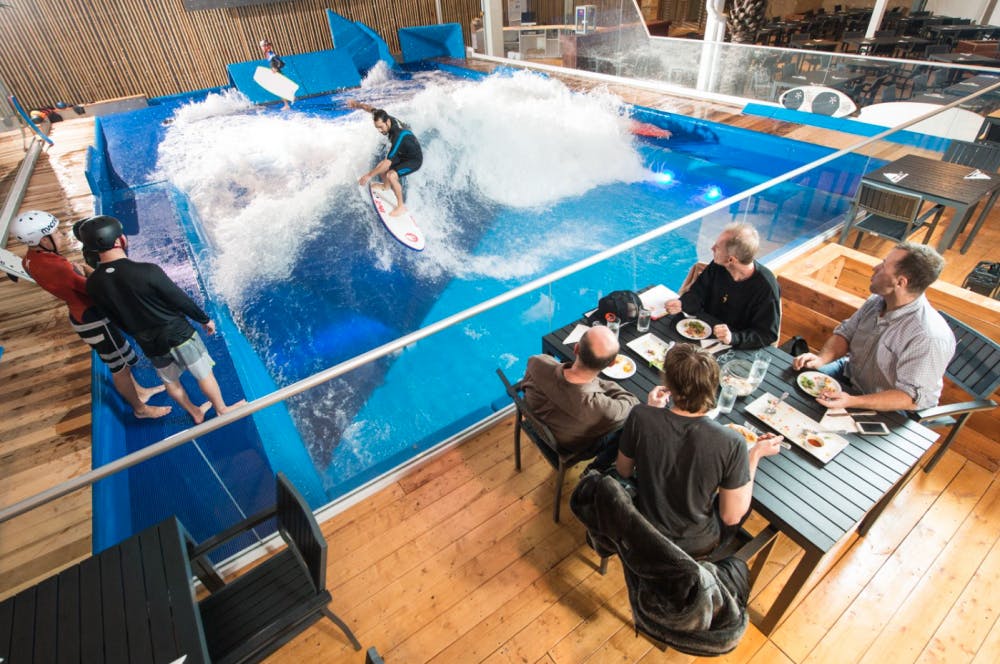Retail’s new trick: Using surfing to catch more than a wave
5/1/2015 at 12:14pm
By Krystina Gustafson, Content Editor and Retail Reporter at CNBC
These big-box department stores are some of the names that come to mind when picturing a typical anchor tenant at the mall. One company, however, is hoping to change that.

As mall traffic continues its steady decline—dropping 10 percent as of Saturday for the month of April—American Wave Machines is challenging the idea that anchor tenants need to be stores at all.
An anchor has been seen as a store that is so popular that it is a shopping center’s main draw. But what if shoppers come to the mall for another reason?
Robert Reynolds, chief operating officer of the company that designs and manufactures surf pools, said American Wave Machines’ technology possesses all the same qualities a traditional anchor tenant is supposed to have, minus the old-fashioned box.
For one, Reynolds said his company’s surf pools encourage consumers to visit a mall, often on a repeat basis. For another, they increase the amount of time people spend on the property. The pools also drive food and beverage sales incrementally higher, as visitors post up to watch surfers master the waves—or wipe out.

“For malls that are more challenged because of the marketplace or as the economies have changed, they’re looking at this as something they could put across their portfolio,” Reynolds said.
American Wave Machines, whose pools have also been installed at surf parks, water parks and resorts around the world, first got its feet wet at retail in 2011, when it launched at the open-air Sur Plaza Boulevard shopping center south of Lima, Peru. Nearly four years later, the company opened its second retail location at Oasis Surf, a facility inside Quartier DIX30 in Brossard, Quebec, where thousands of surfers have paid 30 Canadian dollars ($25) for a 30-minute chance to ride the waves.
But Reynolds said American Wave’s presence at shopping centers is just getting started. Its third retail pool is set to launch at New Jersey’s American Dream megamall, a project whose much-delayed opening is slated for the second half of 2016. Reynolds said the company is also in “advanced conversations” with larger mall owners, who are interested in including the technology across their portfolios.
American Wave’s expansion at shopping centers comes at a time when mall operators are looking for innovative ways to bring shoppers to their properties. As a growing portion of retail sales are conducted online, malls and retailers are striving to deliver to shoppers experiences that they can’t replicate on their computers, smartphones and tablets.
Over the holidays, for instance, Taubman Centers brought Disney’s “Frozen” to life at 10 malls, by opening a themed ice palace. An innovative property in Las Vegas, dubbed the Grand Bazaar Shops, had each of its 120 tenants devise their own way of bringing interactivity to the space. Alex and Ani, for example, lets shoppers try on jewelry using virtual reality.
Virginia Morris, vice president of global consumer and innovation strategy at Daymon Worldwide, said that although these sorts of interactive initiatives should boost traffic and sales, that’s not all they boil down to.
“It’s more about the buzz and the talk value of the experience that you’re getting,” she said.
Though Reynolds declined to give specifics on the traffic boosts the properties received after opening their surf pools, he did say that there are times when there’s a three- to four-week wait to book a 30-minute session riding the artificial waves. He added that the average consumer dwell time on the properties increased between 15 and 20 minutes.
In addition to increasing the amount of time spent per visit, the attraction encourages visitors to keep coming back.
“You get repeat customers because they want to be better at it,” Reynolds said.
Claude Coudry, founder of Oasis Surf (the venue where American Wave Machines’ technology is used at DIX30) added that the attraction has brought new clientele to the center.
Though installation costs vary depending on the location and size of the pool, Reynolds said the average for a commercial unit is about $3 million. The clientele spans from experienced surfers who bring their own boards, to “aspirational” surfers who are trying to learn.

